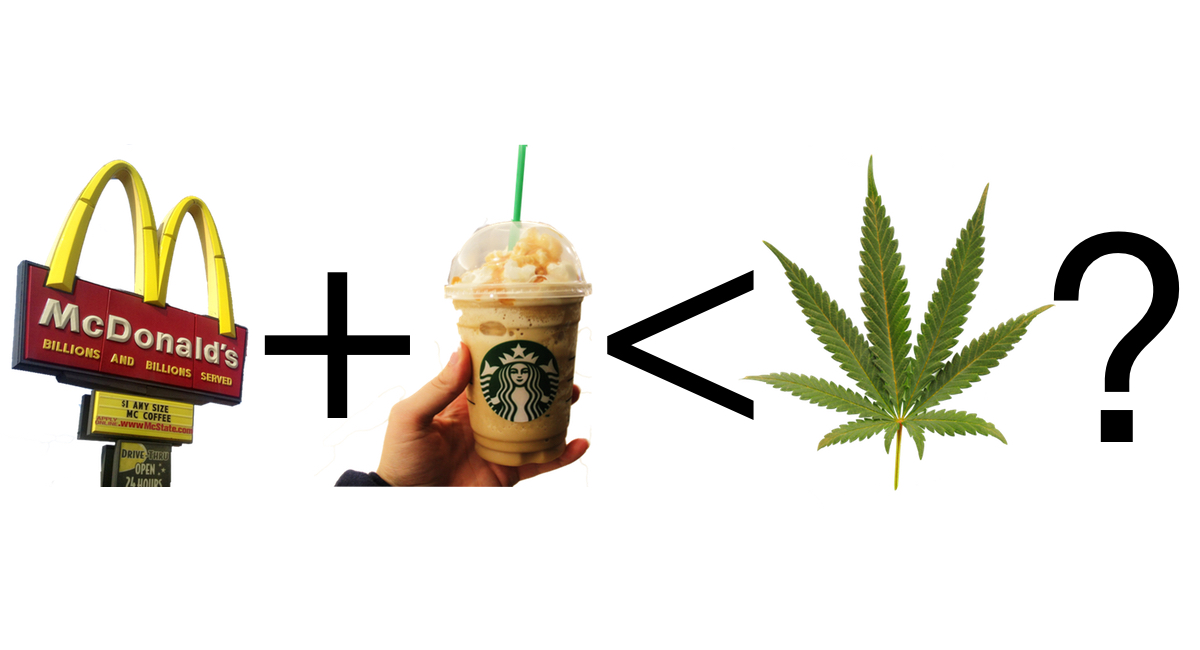Could Mass. See More Pot Shops Than McDonald’s and Starbucks Combined?

Photo illustration by Spencer Buell. “#23 Espresso Light” by Ambernectar 13 on Flickr/Creative Commons. “McDonald’s” by Mike Mozart on Flickr/Creative Commons. iStock.com/IvanMikhaylov
A super-sized claim about what the future holds for Massachusetts should voters usher in an era of legalized marijuana for recreational purposes is making the rounds this election year.
Big Marijuana’s plan for the state, according to the group leading opposition to the legalization ballot question, is to “create more pot shops than McDonald’s and Starbucks combined.”
The assertion showed up in a campaign fundraiser email from the Campaign for a Safe and Healthy Massachusetts this week, and it’s also appeared in press releases and in interview after interview after interview as legislators take the anti-legalization message back to their home districts.
But is it true? Could Massachusetts really end up with as many places to buy nuggets of herb as there are places to buy nuggets of chicken?
After all, there are at least 168 Starbucks cafés in the state, according to the company’s public records, and 240 McDonald’s, according to a representative for the fast food giant.
So that means more than 400 marijuana retail stores would need to be in business in the Commonwealth in order to outnumber the homes of both the Big Mac and the Frappuccino. It might sound a little Filet-O-Fish-y, but there does appear to be some precedent for the McTalkingPoint.
In Colorado, there are 440 marijuana retail stores and 531 medical dispensaries, roughly double the combined number of McDonald’s and Starbucks chains.
In Oregon, there are more than 400 places to buy marijuana legally, which is roughly on par with the number of McDonald’s and Starbucks, and there are hundreds of pending applications to open new dispensaries in that state.
“We’ve seen in Colorado, which this law is largely modeled after, that it’s allowed a huge number of retailers, a huge number of pot shops, to grow at an incredibly rapid rate,” says Corey Welford, spokesman for the Campaign for a Safe and Healthy Massachusetts, in an interview. “They’re predicting a billion dollar industry [in Massachusetts] within years of when this ballot question is passed. That is exactly comparable to Colorado.”
Massachusetts, with its 6.8 million residents, also has a bigger population than both Colorado (5.5 million) and Oregon (4 million).
Advocates for Question 4’s passage, meanwhile, say the idea that Massachusetts could see 400 or more pot stores is a bunch of baloney.
Reached by phone, Jim Borghesani, spokesman for the pro-legalization Yes on 4 campaign (formerly the Campaign to Regulate Marijuana Like Alcohol), says there is no basis for such an estimate, calling it “outright fear-mongering.”
The law, should voters approve it, would cap the number of dispensaries in the state at 75 for the first year, he says, adding that reaching that benchmark is itself unlikely. The initiative would also set up a state-run Cannabis Control Commission, which, according to Borghesani, would have the authority to limit how many new locations open.
He declined to estimate how many shops might open in Massachusetts in the next few years if the initiative passes, but he says no one should anticipate stores opening by the hundreds.
“Massachusetts being a smaller state with towns much closer together than in Colorado or Oregon, we just don’t see any likelihood that it’s ever going to get to that figure,” Borghesani says.
What’s certainly clear is Massachusetts would have a long way to go to match the numbers seen in states further west. Right now, there are just seven medical marijuana dispensaries in the Commonwealth. The rollout of the medical marijuana law here has been really, really slow.
In Oregon, by comparison, the state already had hundreds of medical marijuana dispensaries—outnumbering its McDonald’s and Starbucks stores—before recreational marijuana became legal.
But let’s say, for argument’s sake, that passing Question 4 leads to a vast network of marijuana retail outlets in Massachusetts. Would that matter? Does it make a difference whether we end up meeting demand with a whole lot of small pot shops versus a smaller number of bigger ones? (For reference, there are 2,917 liquor stores in Massachusetts, according to state officials).
It does, says Welford, from the “no” camp.
He says there are “public safety” concerns to consider. An increase in ease of access to the substance could lead to more drug use statewide, he says, or to an uptick of impaired driving. He also points to a Politico article from May, which describes how low-income neighborhoods in Colorado have borne many of the negative effects of the state’s rapidly expanding new industry.
But Borghesani, of Yes on 4, says it doesn’t. He notes that Coloradans are quite comfortable with their pot shops (a majority of them have viewed the legalization rollout favorably), whether or not there are more stores hawking buds and THC-spiked brownies than Shamrock Shakes and pumpkin spice lattes.
“The people who have created jobs in Colorado—the jobs, the revenue—no Colorado people are complaining about this,” he says, adding that local opponents are “using this as a talking point, a scare point, for Massachusetts residents, when in actuality the towns and cities in Colorado, it was their decision to opt into the system, and it’s creating jobs and revenue and they seem pretty happy.”
Note: The number of McDonald’s locations in Colorado and Oregon cited in this article was culled from a website that aggregates online restaurant data, called Menuism.

